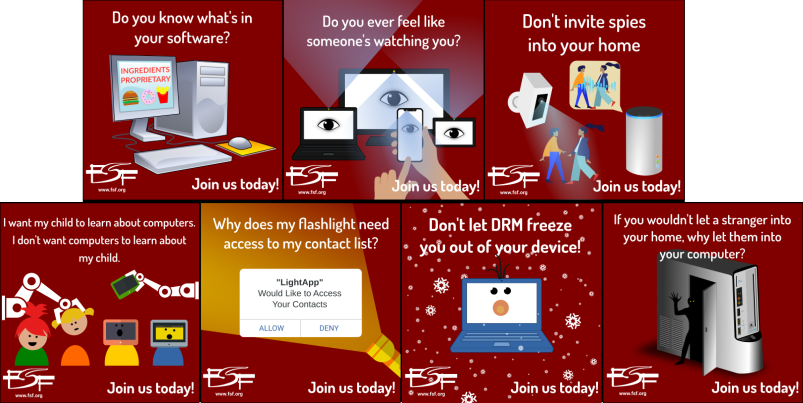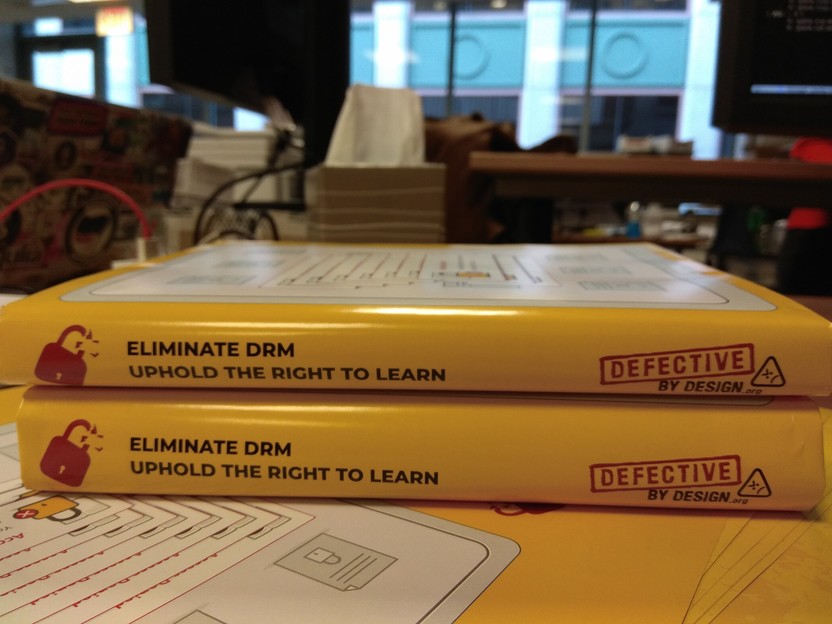The FSF can't campaign for free software without your help
jeudi 19 décembre 2019 à 20:16The Free Software Foundation's (FSF) campaigns team works tirelessly to spread the message to the world that all software must be free. Campaigning for free software takes creativity, hard work, and a dedicated community. We amplify free software organizations and projects, mobilize activists, and provide resources. We're only three people, but we are the point of connection for hundreds of thousands of supporters annually. You hold the power to exponentially increase this number. It is our goal to make the free software conversation a kitchen table issue, and we need your help!
Since many families and friends get together at the end of the year, we worked with our recent FSF intern, Valessio Brito, on translating some of the reasons why our fight is so important into illustrations, to facilitate conversations during these gatherings.
The images we developed, which we are using in our annual fundraiser, seek to raise the issue of free software by focusing on common issues with proprietary software, like privacy violations, exemplified by a simple flashlight app and its permissions in your device. We visualize issues like data mining, back doors into your devices, and the vulnerability of cameras and microphones in so-called "smart devices." We also comment on Digital Restrictions Management's (DRM) power over you and your devices. We put a lot of thought into designing these images to be conversation starters, and now we're asking you, as the free software community and our main channel of communication, to share them. You can find the images, their embed codes, and their .SVG source files on the FSF Web site. Please use them to start conversations with the people you care about, using the hashtag #ISupportFreeSoftware.
And if you're able to, can you take the next step and become an associate member today to help us reach our goal of welcoming 600 new associate members before December 31st? As a special bonus, all new and renewing annual associate members ($120+) can choose to receive one of our exclusive year-end gifts.
If you can't become a member yourself, you can make a donation instead. Every dollar you contribute helps the campaigns team bring awareness to the cause.
Why free software needs you
It is not always easy to quantify the work we do here in the campaigns team. Developing campaigns, writing articles, creating online educational resources and other tools, updating pages on a range of Web sites, organizing events, organizing protests and creative attention-getting actions both online and offline, working together with other organizations, and staying up to date with the most recent developments in both proprietary, as well as free, software is a full time job for the three of us, and we wish we had more time.
Internally, the principle of using free software is first and foremost. In our digital culture of today, using only ethical tools is a challenging effort if you want to convey an important message. And so we are always looking for ways to reach people without compromising our own values or setting a bad example. We choose not to weaponize analytics, or networks like Facebook or Google that exploit users in order to increase the reach of our campaigns, nor do we want to use a data mining company like Eventbrite to promote our events and handle our registrations. Instead, we choose to remain true to our mission and reject these companies in favor of your right to freedom-respecting online communications.
Making ethical decisions, however, also means that spreading our message is much more challenging. We therefore depend heavily on the engagement of free software enthusiasts like you to spread the word with us about our events, campaigns, and collaborations, and to let us know about what event or project we should be boosting or supporting. With two of the three team members starting only this year, we have worked hard on educating ourselves, updating our resources, and strengthening our connection to the community. And with your help, we can do so much more in the year to come.
Visual advocacy
We are well aware that advocating a social movement has become increasingly visual, so we work closely with designers to illustrate our message and calls to action in both static and moving images. We need to break through the noise with appealing imagery, help explain the issues we face in an engaging way, and make it easily shareable. This year, we visually improved the quality of the biannual Free Software Bulletin, the LibrePlanet wiki, and the LibrePlanet conference Web site, and we've created shareable images, and updated our donation pages. Next on the list will be a review of our printed advocacy materials.
Making connections
In-person experiences are valuable and important for the FSF to network and to learn from other free software enthusiasts, as well as to help us spread the message and bring new people into the fold.
This year, we organized four member meetups in different locations in the US, and we hosted free software introductions to students of local public schools. We also organized the LibrePlanet conference with live instances on IRC (#libreplanet on Freenode) and mumble, and livestreamed all 40 sessions on social justice and technology. We held our annual associate member meeting, a "hackathon," an FSF office open house, and two social events during this time as well. We were also one of two EmacsConf satellite instances, and took to the streets in protest of DRM twice this year, once (in conjunction with fourteen online partners) to stand up for students against Pearson Education for the International Day Against DRM (IDAD), and once against Disney+ at the opening night of Frozen II, here in Boston.
To organize quality events such as LibrePlanet, IDAD, Continuing Legal education (CLE) seminars, and others, we need to invite speakers and collaborators from all over the world, and we also need to make sure the events are accessible remotely. With your support, we can add an additional "workshop room" to the annual LibrePlanet conference, host smaller educational gatherings and talks throughout the year, do more student outreach, and grant more speakers and attendees access to events by growing our scholarship fund. We will work together with other organizers to set up and promote local instances of events, like an upcoming LibrePlanet 2020 satellite in Ontario, Canada, and we are developing a program to help financially support free software local activist groups.
Public speaking is another way of increasing our footprint in the community. Campaigns manager Greg Farough spoke at a local maker space, and executive director John Sullivan traveled to both South America and Europe to talk about free software issues this year. We also host informational booths all over the world, with the help of volunteers and our operations team. These are very effective way of reaching a large audience, and so we want to do more of it.
The campaigns team is at the center of all communications and events here at the FSF, working closely with all other teams. Along with the tech team, we are always thinking about how we can improve the user experience of our campaigns and our Web sites. Together, we are working on developing a petition site to allow us to turn around signature actions quickly, and on a major update to the fsf.org Web site, which will enhance user experience on mobile phones. With the licensing team, we work to release the latest Respects Your Freedom (RYF) announcements, and we organize the CLE seminars to educate law professionals on licensing issues.
Free software needs you
The physical moments, like the seminars, meetups, speaking engagements, and conferences, are in-depth, valuable meetings with people where we learn and educate at the same time. Online, we hope to inspire people, show newcomers an entry into the world of free software, and give others a voice. On announcement days, we turn our local Boston office into a bustling news room while we edit all communications, talk about targeting and staying on message, brainstorm visuals, and line up the timing of all the separate elements.
We do this work with passion, in a community that time and time again
shows us how much you care, and we therefore ask you to help us
recruit. We need to overcome the false sense of safety and freedom
created by proprietary software company marketing machines executed on
mainstream media. Making ethical decisions means not taking the easy
way out, and it takes all of us. Just imagine, if each person reading
this message recruited just 5 others into the community, the free
software movement would immediately be in the millions.
Images by Valessio Brito, Copyright © 2019 Free Software Foundation, Inc., licensed under CC0, no rights reserved.

